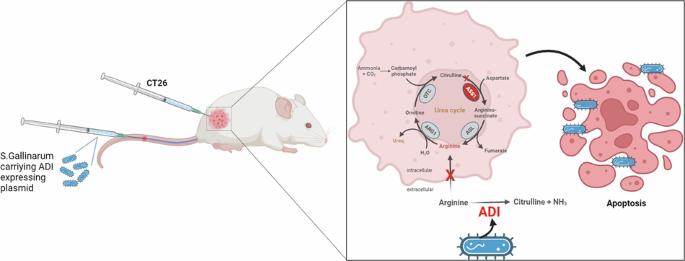Enhanced anti-cancer efficacy of arginine deaminase expressed by tumor-seeking Salmonella Gallinarum
IF 6.9
1区 医学
Q1 BIOCHEMISTRY & MOLECULAR BIOLOGY
引用次数: 0
Abstract
Amino acid deprivation, particularly of nonessential amino acids that can be synthesized by normal cells but not by cancer cells with specific defects in the biosynthesis pathway, has emerged as a potential strategy in cancer therapeutics. In normal cells, arginine is synthesized from citrulline in two steps via two enzymes: argininosuccinate synthetase (ASS1) and argininosuccinate lyase. Several cancer cells exhibit arginine auxotrophy due to the loss or down-regulation of ASS1. These cells undergo starvation-induced cell death in the presence of arginine-degrading enzymes such as arginine deaminase (ADI). Thus, ADI has emerged as a potential therapeutic in cancer therapy. However, the use of ADI has two major disadvantages: ADI of bacterial origin is strongly antigenic in mammals, and ADI has a short circulation half-life (∼5 h). In this study, we engineered tumor-targeting Salmonella Gallinarum to express and secrete ADI and deployed this strain into mice implanted with ASS1-defective mouse colorectal cancer (CT26) through an intravenous route. A notable antitumor effect was observed, suggesting that the disadvantages were overcome as ADI was expressed constitutively by tumor-targeting bacteria. A combination with chloroquine, which inhibits the induction of autophagy, further enhanced the effect.

肿瘤寻源沙门氏菌表达的精氨酸脱氨酶增强了抗癌功效。
氨基酸匮乏,尤其是正常细胞能合成但生物合成途径存在特定缺陷的癌细胞不能合成的非必需氨基酸,已成为癌症治疗的一种潜在策略。在正常细胞中,精氨酸通过两种酶分两步从瓜氨酸合成:精氨酸琥珀酸合成酶(ASS1)和精氨酸琥珀酸裂解酶。由于 ASS1 的缺失或下调,一些癌细胞表现出精氨酸营养不良。在精氨酸脱氨酶(ADI)等精氨酸降解酶的作用下,这些细胞会发生饥饿诱导的细胞死亡。因此,ADI 已成为癌症治疗的一种潜在疗法。然而,使用 ADI 有两大缺点:源于细菌的 ADI 在哺乳动物体内具有很强的抗原性,而且 ADI 在血液循环中的半衰期很短(5 小时)。在本研究中,我们设计了能表达和分泌 ADI 的肿瘤靶向胆囊沙门氏菌,并将该菌株通过静脉注射途径植入 ASS1 基因缺陷小鼠结直肠癌(CT26)。观察到了显著的抗肿瘤效果,这表明肿瘤靶向细菌组成型表达的 ADI 克服了其缺点。与可抑制自噬诱导的氯喹联合使用可进一步增强效果。表达精氨酸脱氨酶(ADI)的加里纳氏沙门氏菌对精氨酸依赖性原位肿瘤的抗癌作用。
本文章由计算机程序翻译,如有差异,请以英文原文为准。
求助全文
约1分钟内获得全文
求助全文
来源期刊

Oncogene
医学-生化与分子生物学
CiteScore
15.30
自引率
1.20%
发文量
404
审稿时长
1 months
期刊介绍:
Oncogene is dedicated to advancing our understanding of cancer processes through the publication of exceptional research. The journal seeks to disseminate work that challenges conventional theories and contributes to establishing new paradigms in the etio-pathogenesis, diagnosis, treatment, or prevention of cancers. Emphasis is placed on research shedding light on processes driving metastatic spread and providing crucial insights into cancer biology beyond existing knowledge.
Areas covered include the cellular and molecular biology of cancer, resistance to cancer therapies, and the development of improved approaches to enhance survival. Oncogene spans the spectrum of cancer biology, from fundamental and theoretical work to translational, applied, and clinical research, including early and late Phase clinical trials, particularly those with biologic and translational endpoints.
 求助内容:
求助内容: 应助结果提醒方式:
应助结果提醒方式:


